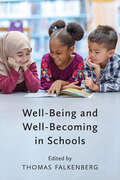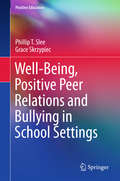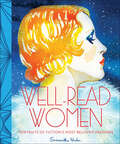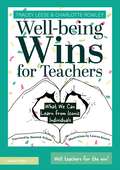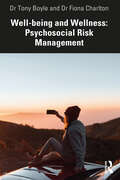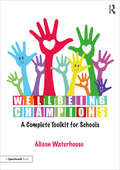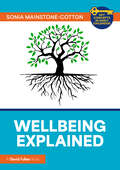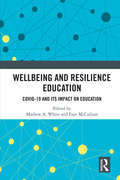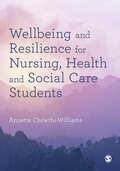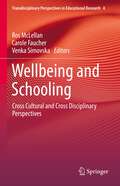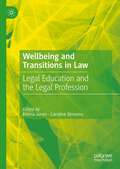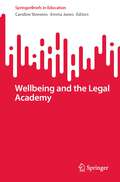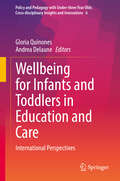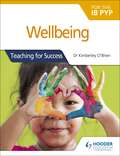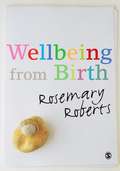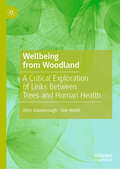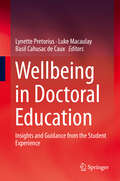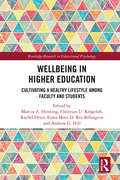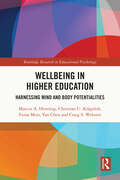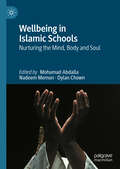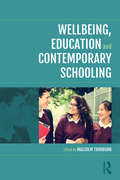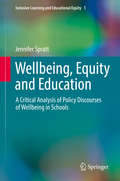- Table View
- List View
Well-Being and Well-Becoming in Schools
by Thomas FalkenbergBy its very nature, school education is concerned with student well-being. Written by Canadian education scholars from a Manitoba-based research group, Well-Being and Well-Becoming in Schools aims to develop the notion that what we wish for our children is their well-being and well-becoming as they live their lives. This collection brings education scholars together to focus on a timely topic that has been of rapidly increasing interest to the research and education communities: student well-being and flourishing schools. Contributors address a broad range of issues that arise from this position to create a rich and integrated understanding of the topic. Chapters focus on foundational issues, conceptual issues, socio-cultural and organizational issues, and pedagogical and curricular issues. Ultimately, Well-Being and Well-Becoming in Schools weaves together substantial ideas to create an integrative framework that will not only serve as a guide for further research, but also for school educational leaders and educators to implement the idea of making school education primarily about student well-being.
Well-Being, Positive Peer Relations and Bullying in School Settings
by Phillip T. Slee Grace SkrzypiecThis book focuses on well-being at school in association with positive peer relationships and bullying. Taking an integrative and community-based approach, the book outlines the significance of student-school relationships for well-being and emphasizes the importance of school and classroom climate for promoting well-being. Embedded in research and theory, the book reflects the belief that all of our dealings with children and young people in whatever role, whether as parent or teacher or in some other capacity, are bounded by theory, either implicit or explicit. The book highlights the role of partnerships and linkages in addressing school-based well-being and anti-bullying programs. It pays special attention to the barriers and facilitators that schools must address in engaging with external agencies to deliver strong evidence-based initiatives. The international concern with school bullying is given particular consideration in relation to its impact on the well-being of all involved. A feature of the text is the focus given to the implementation of programs into the busy and complex world of schools and classrooms recognizing that the effectiveness and impact of any school-based program is strongly related to the quality of its implementation. The text reflects a commitment of the authors to a broad-based systemic view of development, taking into account family, school, community and culture as influential factors. The text incorporates a number of pedagogical features e. g. classroom based activities and discussion starters, reflections on points raised in the text, and case studies. This book is of special interest to teachers, school counselors, educational psychologists and mental health professionals working in school settings.
Well-Read Women: Portraits of Fiction's Most Beloved Heroines
by Samantha Hahn“They’re all here—Clarissa Dalloway, Dorothea Brooke, Nancy Drew—and each one is drawn so magnificently that their authors would rejoice as we rejoice.” —Emma Straub, New York Times bestselling author A treasure of a gift for the well-read woman, this collection brings together fifty stirring portraits, in watercolor and in word, of literature’s most well-read female characters. Anna Karenina, Clarissa Dalloway, Daisy Buchanan . . . each seems to live on the page through celebrated artist Samantha Hahn’s evocative portraits and hand-lettered quotations, with the pairing of art and text capturing all the spirit of the character as she was originally written. The book itself evokes vintage grace reimagined for contemporary taste. In the hand and in the reading, here is a new classic for the book lover’s library.“These women are important. They illuminate the world. So read, read, read their words. And learn what life is.” —Maira Kalman, bestselling author and illustrator of Beloved Dog“Richly illustrated and exquisitely hand-lettered, Well-Read Women is the perfect convergence of literature and art—and a wonderful gift for any passionate reader. I have devoured it already several times over.” —Lisa Congdon, artist and author of Find Your Artistic Voice“Samantha Hahn’s exuberant watercolors paired with sharply chosen quotes feel at once nostalgic and modern, stylish and genuine. All qualities befitting the complex women she renders.” —Stella Bugbee, Styles Editor, TheNew YorkTimes“The perfect collection of our favorite fictional heroines brought to life in gorgeous illustrations by the immensely talented Samantha Hahn—it’s destined to become a classic and inspire readers and artists alike.” —Christiane Lemieux, founder/CEO, The Inside, and author of Undecorate
Well-being Wins for Teachers: What We Can Learn from Iconic Individuals
by Tracey Leese Charlotte RowleyThis exciting and inspiring text offers easy-to-implement strategies and tools to improve teacher well-being in schools. Teacher well-being is of paramount importance in the profession and has never been as necessary as it is today, even being included at the heart of the current Ofsted framework. Drawing together theory, popular culture and real-life stories from teachers, each chapter focuses on one of ten inspirational and iconic individuals from diverse backgrounds as archetypes to explore key strands of well-being including healthy habits, resourcefulness, resilience, managing pressure, workload, time management and positivity. Emphasising the importance of well-being and aspiration for teachers at all stages of their career, the chapters feature: a constructed definition of each icon and how their achievements translate into the teaching profession a case study exploring how a teacher has overcome well-being challenges in their career and how this shaped them as a professional key lessons and takeaway actions. Including a foreword by Hannah Wilson, Co-founder and Director of Diverse Educators, Well-being Wins for Teachers translates the abstract notion of well-being into tangible and practical strategies for all teachers.
Well-being and Wellness: Psychosocial Risk Management
by Tony Boyle Fiona CharltonWell-being and Wellness: Psychosocial Risk Management is a companion to Health and Safety: Risk Management that describes the techniques and background knowledge for preventing injury and ill health in the workplace. The new book instead describes the techniques and background knowledge for preventing impairment of worker well-being and wellness.These techniques differ from those required for the prevention of injury and ill health because of the need to take into account individual differences in susceptibility to psychosocial risk sources, and the fact that psychosocial risk sources can provide opportunities as well as threats. The book is divided into two parts: Part I describes the required background knowledge, including the nature of psychosocial harms to individuals, what can trigger these harms, and what can be done to mitigate these harms, and also deals with the necessary psychological background and the role of individual differences in reactions to psychosocial risk sources. Part II describes an outline psychosocial management system based on the ISO 45001 specification and the guidance in ISO 45002 and ISO 45003. However, the nature of the psychosocial risk sources being dealt with means that the ISO 45001 requirements must be extended in a number of ways, for example, by having threat and opportunity assessment, rather than risk assessment.Written primarily for OH&S professionals who wish to extend the scope of their management system to include well-being and wellness issues, the book is also directly beneficial to human resources (HR) professionals who have the responsibility for managing psychosocial hazards such as bullying and harassment. Additionally, it can be understood and applied by managers in all sectors who want to improve the well-being and wellness of their team, and it will be a relevant reading for students on OH&S, HR, or management courses.
Wellbeing Champions: A Complete Toolkit For Schools
by Alison WaterhouseWellbeing Champions is a practical toolkit designed to support primary and secondary schools working with children to co-create a group of Wellbeing Champions. Full of detailed resources to support both the recruitment and training of children and young people to support others in their school settings, this book has been carefully created to ensure that emotions, self-care, resilience, communication and support systems are considered in order to promote and support positive mental health and wellbeing throughout the school setting. Containing ideas for specific training as well as considering a whole school approach, the resources and tools have been designed to support practitioners, teachers, children and young people to find out what their school does well and to identify areas for development. With a wealth of photocopiable resources, including supervision and training sessions, risk assessments, application forms, feedback forms and certificates, this book offers: all the practical resources needed to recruit and interview children and young people for the role, including an outline job description and personal specifications a manual that enables teachers to recruit, train and develop the role of Wellbeing Champions within their school support to teachers and Wellbeing Champions to develop the role needed within their school easy-to-follow, user-friendly sections that can be easily adapted lessons and activities that support the Wellbeing Champions and help them understand their role and develop the knowledge and skills to support other young people Packed full of activities to help promote and support social and emotional skills development and positive mental health and wellbeing within schools at KS2, KS3 and KS4, Wellbeing Champions is the ideal resource for teachers and practitioners, focused on pastoral development, mental health and wellbeing and social and emotional development in children and young people.
Wellbeing Explained (Key Concepts in Early Childhood)
by Sonia Mainstone-CottonNurturing children and supporting their wellbeing is vitally important, along with looking after the wellbeing of the staff who support them. Wellbeing Explained highlights the importance of wellbeing and explains key terms associated with wellbeing and mental health needs. Unpicking terms such as holistic development, self-esteem, SEMH, and anxiety, it uses practical examples and case studies to explain what these mean and how we can promote wellbeing through policy and practices.Divided into two parts, the first provides a brief overview of the key terms associated with wellbeing in early childhood alongside examples of what they mean in practice. Part two then shares the principles that underpin promoting good wellbeing, such as prioritising staff wellbeing, adopting a loving pedagogy, keeping the child and family central to provision, and creating an enabling environment explaining the underlying ethos of a child-centred approach.Part of the Key Concepts in Early Childhood Series, this is essential reading for early years practitioners and students that want to know and understand what they can do to support their own wellbeing and the children they work with.
Wellbeing and Resilience Education: COVID-19 and Its Impact on Education
by Mathew A. White; Faye McCallumWellbeing and Resilience Education engages with the immediate impact of the Covid-19 pandemic and the theoretical and applied elements of wellbeing and resilience education. It explores the implications for students, teachers, and teaching from a transdisciplinary and international perspective. Featuring thirteen chapters written by 27 academics from across the globe, it includes new transdisciplinary research by organisational psychologists, psychologists, neuroscientists, policy experts and education researchers. The book comprises a wide range of topics including: appreciative inquiry, educational leadership, refugee education, resilience education, designing online courses, teacher wellbeing and community responses during the Covid-19 pandemic. This timely volume will be of interest to academics, initial teacher educators, postgraduate students, school leaders and policymakers researching the field of wellbeing, resilience, education, schools, and schooling.
Wellbeing and Resilience for Nursing, Health and Social Care Students
by Annette Chowthi-WilliamsThis book has been designed to support, improve and maintain your wellbeing throughout your programme of study and into your career. Becoming a health and social care professional means that you will encounter challenging situations from a very early stage in your course, and protecting your own health and wellbeing is essential whilst caring for others. Written by an expert team, this book will equip you with the tools, resources and strategies you need to develop your resilience and care for your wellbeing. In doing so, it develops other essential skills including communication, problem-solving,research, critical thinking and reflection, thereby supporting your personal and professional development, and key requirements for your course. Key features: - Written specifically for the nursing, social work and allied health professions and the particular challenges these roles face - Practical activities and case studies help you apply key concepts to your personal context and professional practice - Features a personal wellbeing journal to help you assess, monitor and improve your wellbeing
Wellbeing and Resilience for Nursing, Health and Social Care Students
by Annette Chowthi-WilliamsThis book has been designed to support, improve and maintain your wellbeing throughout your programme of study and into your career. Becoming a health and social care professional means that you will encounter challenging situations from a very early stage in your course, and protecting your own health and wellbeing is essential whilst caring for others. Written by an expert team, this book will equip you with the tools, resources and strategies you need to develop your resilience and care for your wellbeing. In doing so, it develops other essential skills including communication, problem-solving,research, critical thinking and reflection, thereby supporting your personal and professional development, and key requirements for your course. Key features: - Written specifically for the nursing, social work and allied health professions and the particular challenges these roles face - Practical activities and case studies help you apply key concepts to your personal context and professional practice - Features a personal wellbeing journal to help you assess, monitor and improve your wellbeing
Wellbeing and Schooling: Cross Cultural and Cross Disciplinary Perspectives (Transdisciplinary Perspectives in Educational Research #4)
by Venka Simovska Carole Faucher Ros McLellanCollectively, the research presented in this book revisits, challenges, and rearticulates taken-for-granted wellbeing conceptualisations, policies and intervention frameworks, as critical discussion of wellbeing in relation to children and young people from a variety of socio-cultural, political, and economic settings is still relatively sparse. The contributions work synergistically to generate a sophisticated understanding of children’s wellbeing while introducing fresh and context-sensitive approaches. Pre-conceived and taken-for-granted notions of wellbeing are problematised through four sections in (i) Re-examining conceptualisations of wellbeing in educational research and policy; (ii) Focusing on School environments, schooling, and wellbeing; (iii) Examining the significance of cultural contexts; and (iv) Amplifying children's voices. The objective is to help generate new ways of researching and thinking about wellbeing and schooling, that transcend monocultural, monodisciplinary and monomethodological strategies. The book aims to stimulate further theoretical and empirical research, as well as development of effective policies and school interventions which nuance rather than reduce complexity of both education and wellbeing.
Wellbeing and Transitions in Law: Legal Education and the Legal Profession
by Emma Jones Caroline StrevensThis book examines transitions from law school to the legal profession, and their impact on wellbeing. There is a significant body of evidence that suggests law student wellbeing is particularly problematic, partially due to the distinctive nature of law as a discipline. Similarly, there is a growing body of international evidence demonstrating poor levels of wellbeing within the legal profession, with lawyers suffering higher levels of stress, anxiety and depression than the general population. To date there has been no detailed consideration of the impact of these transitions on wellbeing, or discussion of the best ways to ameliorate any negative effects. This edited collection will explore a range of transitions, from entry into law school through to progression to managerial roles within the legal profession. Rather than focusing on discrete areas or chunks of time, this book focuses on the process of transitioning holistically.
Wellbeing and the Legal Academy (SpringerBriefs in Education)
by Emma Jones Caroline StrevensThis book provides a novel contribution to the wider bodies of literature on student and academic wellbeing by including a series of rich and nuanced discussions of specific aspects of the wellbeing of legal academics. It contains original research contributions on this topic drawing on insights from law, education and psychology and throws a spotlight on an emerging field of interest. In particular, it focuses attention on the need to understand the implications of workload, communication, competence, and community for academic wellbeing with the collection providing insight as to the amelioration of stress linked to these themes. Reference will be made to the key factors which influence each of these themes, such as the neo-liberal academy, the contours and staffing of the law school, the impact of COVID-19 and the role of values and ethics. Relevant theoretical perspectives relating to these themes, including self-determination theory and the notion of an ethic of care, will also be discussed.
Wellbeing for Infants and Toddlers in Education and Care: International Perspectives (Policy and Pedagogy with Under-three Year Olds: Cross-disciplinary Insights and Innovations #6)
by Gloria Quinones Andrea DelauneThis collection explores key issues related to infant and toddler wellbeing, offering diverse international perspectives on how wellbeing is culturally understood. Scholars from Drawing from Australia, Aotearoa (New Zealand), Brazil, Greece, Norway, Portugal and the UK present local conceptualizations that contribute to a broader, global understanding of wellbeing. The international contributors examine wellbeing as a crucial construct, emphasising the importance of relationships, health, emotions, imagination, and professional practice in infant-toddler education. Their research covers various topics, including transitions, peer relationships, love, interactions with objects and environments, conceptualisations of time, pedagogical weaving, Indigenous knowledge, and intra-connectedness. This book highlights the significance of relationships—between people, places, objects, and time—in shaping wellbeing. It challenges readers to reconsider wellbeing as both central to pedagogy and deeply interconnected with humans, non-humans, and vibrant environments. Drawing on diverse theoretical frameworks and research projects, the collection offers rich, multifaceted insights into wellbeing across varied contexts.
Wellbeing for the IB PYP: Teaching for Success
by Dr Kimberley O'BrienTeach for success and implement effective strategies to create flexible, inviting and intentional learning spaces - essential for supporting physical and emotional wellbeing. - Offers guidance on how to support emotional wellbeing with dedicated chapters on Mindfulness, anxiety and stress and the importance of wellbeing and PSEL. - Helps develop fully rounded and responsible learners with exploration of the lB Learner Profile and ATL skills of social, communication and self-management skills with case studies and Dr Kimberley's Top 5 Tips. - Provides a collaborative approach to wellbeing with storybooks (PYP Friends) and workbooks (PYP ATL Skills Workbooks) that can be used alongside this resource to develop your students social and emotional wellbeing.
Wellbeing for the IB PYP: Teaching for Success
by Kimberley O'BrienTeach for success and implement effective strategies to create flexible, inviting and intentional learning spaces - essential for supporting physical and emotional wellbeing. - Offers guidance on how to support emotional wellbeing with dedicated chapters on Mindfulness, anxiety and stress and the importance of wellbeing and PSEL. - Helps develop fully rounded and responsible learners with exploration of the lB Learner Profile and ATL skills of social, communication and self-management skills with case studies and Dr Kimberley's Top 5 Tips. - Provides a collaborative approach to wellbeing with storybooks (PYP Friends) and workbooks (PYP ATL Skills Workbooks) that can be used alongside this resource to develop your students social and emotional wellbeing.
Wellbeing from Birth
by Rosemary RobertsWhat do we mean by wellbeing, and what does it look like as it takes shape in early childhood? What can we do to support the wellbeing of children at home and in settings? This book provides some answers to these complex questions, in a straightforward, accessible way. PART 1: INTRODUCING WELLBEING describes the 'backdrop' for a new model of wellbeing, outlining research and policy background, and underpinning early childhood themes. PART 2: THE THEORY OF WELLBEING defines wellbeing itself, describing the new model and the mechanism of wellbeing development called companionable learning. PART 3: EVERYDAY WELLBEING contains ideas and examples from homes and settings of 'real-life' wellbeing. Chapter 6: 'All to play for' is rich with ideas and examples of "profoundly satisfying" wellbeing play. PART 4: INVESTING IN WELLBEING is about professional development. It covers observation, assessment and planning; the key person approach; 'when things go wrong'; and integrating services across settings and communities. The book ends with the importance of collective wellbeing, arguing that all young children need experiences of individual and collective wellbeing, in their families and their communities. Essential reading for anyone studying early childhood, and for managers and practitioners working with young children and their families, this book is an inspirational guide to developing a framework for wellbeing from birth.
Wellbeing from Woodland: A Critical Exploration of Links Between Trees and Human Health
by Sue Waite Alice GoodenoughThis book provides a framework for understanding the components of woodland wellbeing. Based around the collaborative project, Good from Woods, the book spotlights multiple case studies to explore how wellbeing and health are promoted in woodland settings and through woodland inspired activity. It illustrates forms of wellbeing through real examples of woodland practice and draws out implications for the design of programmes to support health and wellbeing across different client groups. Chapters discuss health and wellbeing from a variety of perspectives such as psychological, physical, social, emotional and biophilic wellbeing.The book will be of great practical use to commissioners, providers and users of woodland based activity who want to take a deeper look into how trees, woods and forests support human health and happiness, as well as of interest to academics and students engaged in research in outdoor activities, urban forestry and natural health and wellbeing.
Wellbeing in Doctoral Education: Insights and Guidance from the Student Experience
by Lynette Pretorius Luke Macaulay Basil Cahusac de CauxThis book offers a range of personal and engaging stories that highlight the diverse voices of doctoral students as they explore their own learning journeys. Through these stories, doctoral students call for an academic environment in which the discipline-specific knowledge gained during their PhD is developed in concert with the skills needed to maintain personal wellbeing, purposely reflect on experiences, and build intercultural competence. In recent years, wellbeing has been increasingly recognised as an important aspect of doctoral education. Yet, few resources exist to help those who support doctoral students. Wellbeing in Doctoral Education provides a voice for doctoral students to advocate for improvements to their own educational environment. Both the struggles and the strategies for success highlighted by the students are, therefore, invaluable not only for the students themselves, but also their families, their social networks, and academia more broadly. Importantly, the doctoral students’ stories should be a clarion call for those in decision-making positions in academia. These narratives demonstrate that it is imperative that academic institutions invest in providing the skills and support that doctoral students need to succeed academically and flourish emotionally.
Wellbeing in Higher Education: Cultivating a Healthy Lifestyle Among Faculty and Students (Routledge Research in Educational Psychology)
by Marcus A. Henning Christian U. Krägeloh Rachel Dryer Fiona Moir Rex Billington Andrew G. HillAcademic staff and students within higher education settings are confronted by a learning environment that is academically stimulating, informative, career-focused and socially rich, which can be intensely competitive and highly charged. Within this learning environment, academic staff and students are often at risk of compromising their wellbeing in their pursuit of academic excellence. This book provides an examination of the key areas that are important to the sustenance of wellbeing within higher education settings, with a view to promoting healthy learning environments. The chapter authors are predominantly working in the Asia-Pacific rim, but the book also includes more universal perspectives. The synthesis of the issues covered in the book is crucial to the understanding of higher education as not only an environment for gaining knowledge and skills relevant for success in academic and career domains, but also as an environment for developing socially adept and authentic communication skills. The ideas presented in this book will further assist academic staff and students to consider ways to more fully participate in their learning environment so that they can optimize their valuable contributions to the professional communities they serve.
Wellbeing in Higher Education: Harnessing Mind and Body Potentialities (Routledge Research in Educational Psychology)
by Yan Chen Marcus A. Henning Christian U. Krägeloh Fiona Moir Craig S. WebsterDrawing on holistic research and professional practice, this book provides rich empirical, scientific, and clinical lenses to the discourse on wellbeing in higher education. The authors have appraised the underlying, conceptual, empirical, and applied nature of existing mind-body programmes often utilized to cultivate wellbeing (e.g., seated meditation, yoga, Taijiquan, Pilates, Feldenkrais, biofeedback, and the Alexander technique). Higher education is touted as a sector that develops new ideas for the wider community as well as ensuring students are provided with the skills, knowledge, and attitudes to positively contribute to the wider community. Within this setting, there are numerous benefits (e.g., attaining a reputable qualification), but there are also risks (e.g., stressors associated with expectations). To ensure the higher education setting is a place of wellbeing in addition to achievement, several strategies are promoted to assist staff and students whilst working and studying. Chapters offer clear implications for research and practice, and explore effective strategies for enhancing wellbeing for students and staff. The integrative mind-body programmes have considerable potential for developing wellbeing in the higher education settings. As such, this book will appeal to academics and researchers in the higher education sector, including scholar-practitioners, and teacher educators.
Wellbeing in Islamic Schools: Nurturing the Mind, Body and Soul
by Mohamad Abdalla Dylan Chown Nadeem MemonIslamic schools are growing exponentially in the West to meet the demands of Muslim learners and their parents. Today, there are hundreds of Islamic schools that are constantly expanding. A key focus of the philosophy of Islamic schools and education is the nurturing of the mind, body and soul. Yet, to date, there is no book that addresses the issue of well-being in Islamic schools. This book provides a comprehensive approach to well-being and highlights both academic and practitioners’ findings, thoughts and experiences as well as school/classroom-based examples related to well-being in Islamic schooling.
Wellbeing, Education and Contemporary Schooling
by Malcolm ThorburnWellbeing, Education and Contemporary Schooling examines the role of wellbeing in schools and argues that it should be integral to core policy objectives in health and education. The whole school focus chosen is conducive to the review of wellbeing in schools, and assists in better understanding the complex relationships between learners and teachers in policy contexts, where every teacher has a responsibility for learners’ wellbeing. By exploring a range of debates about the nature of wellbeing, the book shows how a child’s wellbeing is inseparable from their overall capacity to learn and achieve, and to become confident, self-assured and active citizens. Drawing on international curriculum developments, it considers the ways in which wellbeing could reshape educational aims in areas such as outdoor learning and aesthetic imagination, helping to inform programmes of professional learning for teachers. Separated into six parts, the book covers: philosophical perspectives on wellbeing policy perspectives on wellbeing professional perspectives on wellbeing practice perspectives on wellbeing future prospects for wellbeing a personal perspective on wellbeing. Examining ways in which wellbeing can become a central component of the ethos, culture and environment of contemporary schools, Wellbeing, Education and Contemporary Schooling is an invaluable guide for all students, teachers, researchers and policy makers with an interest in learning, teaching and children’s wellbeing.
Wellbeing, Equity and Education
by Jennifer SprattThis book critically examines multiple discourses of wellbeing in relation to the composite aims of schooling. Drawing from a Scottish study, the book disentangles the discursive complexity, to better understand what can happen in the name of wellbeing, and in particular, how wellbeing is linked to learning in schools. Arguing that educational discourses have been overshadowed by discourses of other groups, the book examines the political and ideological policy aims that can be supported by different discourses of wellbeing. It also uses interview data to show how teachers and policy actors accepted, or re-shaped and remodelled the policy discourses as they made sense of them in their own work. When addressing schools' responses to inequalities, discussions are often framed in terms of wellbeing. Yet wellbeing as a concept is poorly defined and differently understood across academic and professional disciplines such as philosophy, psychology, health promotion, and social care. Nonetheless, its universally positive connotations allow policy changes to be ushered in, unchallenged. Powerful actions can be exerted through the use of soft vocabulary as the discourse of wellbeing legitimates schools' intervention into personal aspects of children's lives. As educators worldwide struggle over the meaning and purpose of schooling, discourses of wellbeing can be mobilised in support of different agendas. This book demonstrates how this holds both dangers and opportunities for equality in education. Amartya Sen's Capability Approach is used to offer a way forward in which different understandings of wellbeing can be drawn together to offer a perspective that enhances young people's freedoms in education and their freedoms gained through education.
Wellesley College
by Arlene CohenOn September 8, 1875, Wellesley College, an undergraduate liberal arts college for women, opened its doors to its first students. Eager, brave, and determined, they came from around the country to begin their new life. They took classes and made their home in College Hall, the grand building founders Henry and Pauline Durant built on a hill overlooking Lake Waban. From the beginning, an outstanding faculty, led and inspired by a series of gifted female presidents, devoted themselves to the education of their students, encouraging intellectual discussion, debate, and analytical thought. In this pioneering world of women's education, a community of learners was born and has thrived for the past 130 years. Wellesley's graduates have carried the tradition of excellence beyond the campus, epitomizing the college's mission "to provide an excellent liberal arts education for women who will make a difference in the world." In photographs and words, Wellesley College tells the story of this school from its early beginnings.
